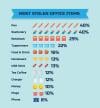Tidy Desk Or Messy Desk: Does It Matter?
Are you a stickler for neatness when it comes to your office desk? Or do you have a more laissez-faire attitude to your workspace? Does being an everything-in-its-place kind of person make you a better, more organised worker? Or does having a relaxed attitude to the leaning tower of documents on your desk free you up to focus on more important things? Here we explore whether it’s better to be a neat freak or a slob in the office.
Vohs’ study
While many people may pour scorn on those who have a tendency to keep their desks cluttered, according to research, being of a messy persuasion may have its advantages. Likewise, those who run a tight ship when it comes to their workspace may give off a more professional impression, yet it seems their penchant for perfection may be holding them back when it comes to something a lot of businesses are looking for - creativity.
Research conducted by Kathleen Vohs, PhD, of the University of Minnesota Carlson School of Management found that working in a messy environment encourages creativity and non-conformist thinking, while working in a tidy setting encourages social responsibility and normatively moral behaviour like eating healthily and giving to charity.
Tidy environments promote social responsibility
As part of the study, which was published in Psychological Science, a journal of the Association for Psychological Science, 34 participants spent time completing questionnaires, with half of the participants working in a tidy room and the other half working in a messy room. When they had finished, the participants were given the option to give to charity. They were also offered a choice between an apple or a chocolate bar as they left. The study found that 82 per cent of people in the neat room donated money to charity, whereas just 47 per cent of people in the messy room did. When it came to the healthy versus unhealthy food choice, the researchers found that 67 per cent of people in the tidy room chose the apple rather than the chocolate, while only 20 per cent of the participants in the messy room picked the healthier option. From this element of the research, it could be inferred that tidy environments promote more socially responsible and healthier behaviours.
Chaotic environments promote creativity
In the second part of the experiment, 48 participants were asked to generate novel uses for a pingpong ball. Again, the participants were split, with half working in the untidy room and half working in the tidy room. Each group came up with the same number of ideas. However, an independent panel rated the messy-room participants’ ideas as significantly more creative than those of the people who worked in the tidy room. This aspect of the study suggests that people working in more chaotic settings are better able to produce original and innovative ideas.
Conformism vs novelty
In the final part of the study, the researchers told 188 participants that they were examining menu preferences for a snack bar. The people were divided again, with half going to messy rooms and half going to tidy rooms. They were given the choice of vitamin boosts for a smoothie, with some labelled ‘new’ and some labelled ‘classic’. The study found that people in neat rooms had a greater tendency to choose the ‘classic’ boost, whereas people in the messy rooms were more likely to choose the one labelled ‘new’. Here we could conclude that people in orderly surroundings are more drawn to traditional frameworks, whereas those in disordered spaces are more open to novel ideas.
Judging vs perceiving
The results of the study resonate with Australian psychologist Susan Nicholson who believes that people who tend to have messy desks have very different personalities than those who prefer a neat and tidy working environment. People with messy desks are more likely to get a ‘perceiving’ outcome on the Myers-Briggs Personality Indicator (MBTI), a self-report personality questionnaire that sorts people into one of 16 personality types.This means that they likely prefer a more flexible and adaptable lifestyle. They also tend to be more creative and comfortable with chaos than their tidier counterparts. People with tidy desks, on the other hand, are more likely to score ‘judging’ on the MBTI. This indicates that they enjoy a more structured, organised and decided lifestyle.
According to Nicholson, ‘perceiving’ people can feel crushed in an organised environment and can fear closing things off before they have all the information. ‘Judging’ people, on the contrary, fear lack of closure so are more likely to make decisions and act quicker.
Nicholson remarks: “Neither is better than the other - just different.”
Successful people and their desks
It’s often said that there’s no recipe for success and it seems that there are no hard and fast rules when it comes to success in relation to organised or disorganised working environments either. While many creatives geniuses, such as Albert Einstein, Steve Jobs and Roald Dahl, appeared to have thrived in chaotic workspaces, others, such as Jane Austen and Bill Gates, seem to have preferred the minimalist approach to their workstations.
Freedom to choose
In conclusion, it seems that what works well for some may not be the best fit for others. If you’re too stringent about creating a culture of clean around your office, be aware that creative ideas may suffer. If you promote a convention of clutter, on the other hand, keep in mind that some people may feel stressed out by the lack of organisation and the moral values of your team may decline. If you’re working with both creatives and non-creatives, the best approach might be to let each individual run their desk as they wish - within limits, of course. Simply by giving your workers this level of power and trust, you might find a boost in morale.









